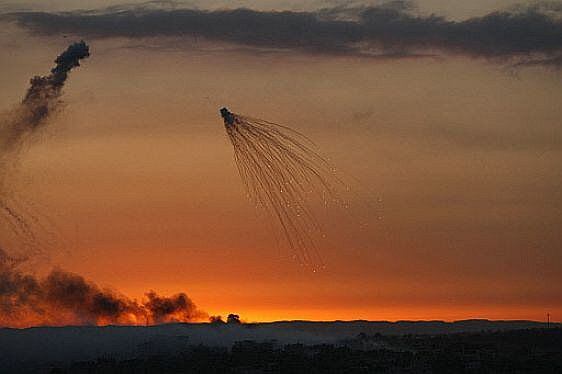
The announcement of the President of the United States, Joe Bidento supply cluster bombs to Ukraine to defend itself against the aggression of Russiahas mobilized organizations such as Human Rights Watch (HRW) and countries like Germany that oppose it as it is prohibited by international law.
Ukraine has claimed it will use them against entrenched Russian troops before their forces advance, while NATO has stressed that it is up to each allied country to supply them.
Already in March 2022, HRW warned that the Russian Army had dropped cluster bombs on Kharkiv on February 28, four days after the start of the invasion of Ukraine, and indicated that these attacks could constitute war crimes given that a percentage Most of the victims were civilians and minors.
The same organization also accused Russia of having committed war crimes in the attack it perpetrated in April 2022 against the Kramatorsk railway station, in eastern Ukraine, for the use of cluster bombs that killed at least 58 civilians.
In parallel, the UN also accused Russia of carrying out at least 24 attacks with this type of ammunition against Ukraine.
Another country where HRW has denounced the use of this ammunition in different bombardments has been in Syria by the regime of Syrian President Bashar El Assad, after the outbreak of the civil war in February 2011, and in this context and during the development of this contest, the Pentagon also accused Russia in 2015 of using them, something that Moscow denied.
Banned in more than a hundred countries
The use of cluster bombs is prohibited in 111 countries and they are especially deadly, since when they fall they release a large quantity of small munitions the size of a soda can that do not always explode on impact on the ground and become anti-personnel mines.
To fight against its use, sale and production, in February 2007 a process began in Oslo where forty-six countries then committed to establishing a framework for cooperation that would ensure the provision of the necessary care and rehabilitation to those affected by these bombs, the cleaning of contaminated areas and the destruction of reserves.
The so-called Oslo Process to advance the arms ban was followed by the Conference held in Vienna in December 2007, which concluded with the agreement of 138 countries on key elements such as assistance to victims and the destruction of stockpiles.
In February 2008, 88 countries of the more than 120 that participated in the Conference on cluster bombs held in New Zealand signed the so-called Wellington Declaration in favor of banning this type of weapon.
The United States, Israel, Russia, China, India and Pakistan, the main producers of these bombs, did not attend the Wellington conference.
On May 28, 2008, the International Convention that prohibits the use, manufacture and storage of this type of bomb was approved in Dublin, although without the participation of the countries that oppose the ban.
Since the entry into force of the agreement, signed in Oslo on August 1, 2010, 111 countries have joined, of which 83 have ratified it, including Spain, Germany, France, the United Kingdom, Chile, Ecuador, Mexico and Uruguay .
The main producers of cluster bombs, such as the United States, Russia and China, are not part of the convention, however.
The latest HRW report referring to 2022 reflects that since the adoption of the convention, the States Parties have collectively destroyed 99% of the total world stockpiles of cluster bombs that they declared, destroying almost 1.5 million cluster munitions and 178 million of submunitions.
The Coalition Against Cluster Bombs (CMC), which is made up of various NGOs and civil movements from more than 50 countries, acts as the promoter of these meetings.
Currently, more than 30 countries manufacture these explosives, which are sold to about 70 nations.
Source: EFE
Source: Gestion
Ricardo is a renowned author and journalist, known for his exceptional writing on top-news stories. He currently works as a writer at the 247 News Agency, where he is known for his ability to deliver breaking news and insightful analysis on the most pressing issues of the day.












